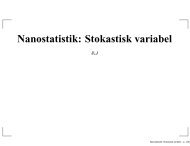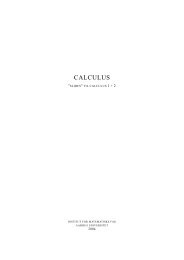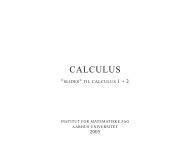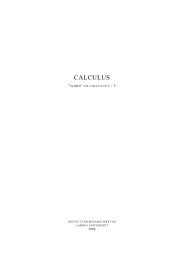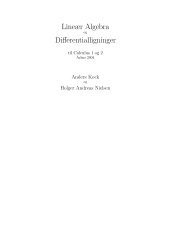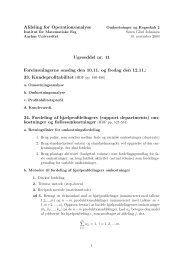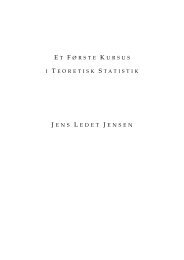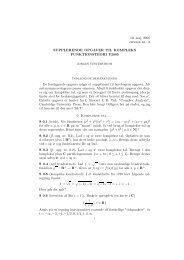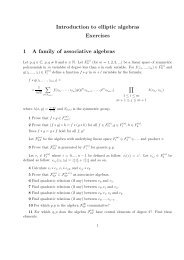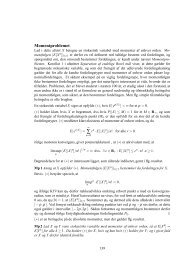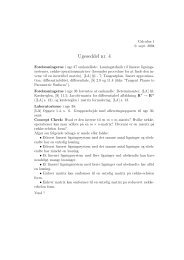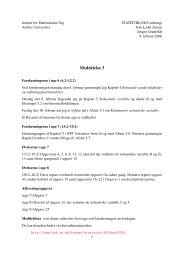Commutative algebra - Department of Mathematical Sciences - old ...
Commutative algebra - Department of Mathematical Sciences - old ...
Commutative algebra - Department of Mathematical Sciences - old ...
You also want an ePaper? Increase the reach of your titles
YUMPU automatically turns print PDFs into web optimized ePapers that Google loves.
78 6. FINITE MODULES<br />
Let the n × n-matrix U = X(1n) − A over R[X] have c<strong>of</strong>actor matrix U ′ . The<br />
relations above give U ′ Uxj = 0, written out by 6.2.4<br />
det U xj = 0<br />
for all j. That is det U M = 0. By calculation<br />
in R[X], with ai ∈ I.<br />
det U = a0 + a1X + · · · + an−1X n−1 + X n<br />
6.3.4. Proposition. Let I ⊂ R be an ideal and M a finite module. If IM = M<br />
then I + Ann(M) = R. That is there is a ∈ I such that (1 + a)M = 0.<br />
Pro<strong>of</strong>. By 6.3.3<br />
Put a = a0 + · · · + an−1.<br />
a01M + · · · + 1M = (a0 + · · · + an−1)1M + 1M = 0<br />
6.3.5. Corollary. Let I ⊂ R be an ideal and M a finite module. If IM = M and<br />
all elements 1 + I are nonzero divisors on M, then M = 0.<br />
6.3.6. Corollary. Let I ⊂ R be an ideal and N ⊂ M a submodule. Suppose M/N<br />
is a finite module and M = N + IM. Then I + (N : M) = R.<br />
6.3.7. Proposition. Let R be a ring and M a finite module. If a homomorphism<br />
f : M → M is surjective, then it is an isomorphism.<br />
Pro<strong>of</strong>. Regard M, f as a module over R[X] 6.3.1. Then (X)M = M, so by 6.3.4<br />
there is p ∈ R[X] such that 1 + pX ∈ Ann(M). For any u ∈ Ker f, calculate<br />
u = u + p(f) ◦ f(u) = (1 + pX)u = 0. So f is an isomorphism.<br />
6.3.8. Exercise. (1) Let √ 0M = M. Show that M = 0.<br />
6.4. Nakayama’s Lemma<br />
6.4.1. Proposition. Let (R, P ) be a local ring and M a finite module. The following<br />
conditions are equivalent.<br />
(1) M = 0.<br />
(2) P M = M.<br />
(3) M ⊗R k(P ) = 0.<br />
Pro<strong>of</strong>. (1) ⇒ (2) ⇔ (3) is clear. (2) ⇒ (1): Elements in 1 + P are units in R, so<br />
by 6.3.5 M = 0.<br />
6.4.2. Corollary. Let (R, P ) be a local ring and N ⊂ M a submodule. Suppose<br />
M/N is a finite module and M = N + P M. Then N = M.<br />
6.4.3. Corollary. Let (R, P ) be a local ring and M, N finite modules. If M ⊗R<br />
N = 0, then M = 0 or N = 0.<br />
Pro<strong>of</strong>. If M, N = 0 then M ⊗R k(P ), N ⊗R k(P ) = 0 are vector spaces over<br />
k(P ). Now M ⊗R N ⊗R k(P ) M ⊗R k(P )⊗ k(P ), N ⊗R k(P ) = 0, giving the<br />
statement.<br />
6.4.4. Corollary. Let R be a ring and M a finite module. The following conditions<br />
are equivalent.<br />
(1) M = 0.



